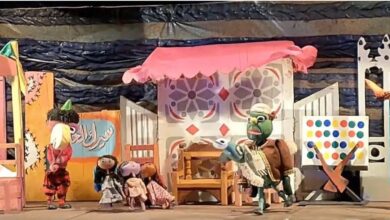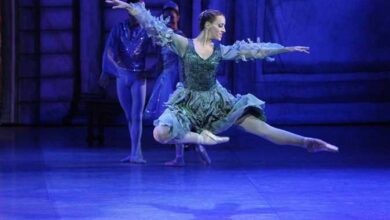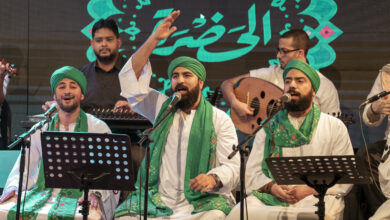For the inauguration of its 19th session last Monday, the Festival and Conference of Arab Music presented a spectacular show that blended music, dance and storytelling to narrate the life story of the late Egyptian singer Abdel Halim Hafez. The Main Hall of the Cairo Opera House in Zamalek was packed with people from Cairo and al-Helwat–Hafez’s hometown–as well as tourists. The theme of the 2010 festival is Arab singing, emphasized through the awards that were decorated with a motif of a mouth singing into a microphone and given to nine musicians, singers, composers and poets who have enriched the Arab music scene over the past few decades.
The main hall was festive as the organizers, performers and audience gathered to celebrate the classical Arab music genre that is steadily becoming less popular, especially among younger generations. Dr. Ratiba al-Hefni, dean of the Arab Music Institute and general secretary of the Arab Music Festival, along with festival director, Gihan Mursi, chose to commemorate one of the most influential singers in Egypt and the Arab world on the festival’s opening night in order to raise greater interest in classical Arabic music.
The audience chanted and clapped along with the musicians as they played a rendition of a popular Hafez duet, originally sung with Egyptian singer Shadya in the 1967 movie, “Ma’abodat al-Jamaheer” (The Idol). The Cairo Ballet ensemble accompanied the music and, although the dancers were slightly out of step, they evoked the spectacular performances from Egyptian movies of the forties to the seventies.
Critic Sami Abdel Halim narrated the show, highlighting important events in Hafez’s life, from his bashing at his first concert in Alexandria to his collaboration with Egyptian composer Mohamed Abdel Wahab and his sad death after a medical surgery in March 1977. Journalist Wagdi al-Hakim, who was a close friend of Hafez, was also invited to tell the audience anecdotes from Hafez’s life.
Hafez was a pioneer of his time. His music was very progressive and had a strong impact on younger generations of singers and musicians. He also became a symbol of the 1952 Revolution and Pan-Arabism. The show ended with Hafez's dream of a united Arab nation. The famous quote was followed by the popular song “Bahlef bi Samaha wi be Trobha” (By Its Sky and Its Earth).
As the audience exited the Main Hall, there seemed to be a general nostalgia for the past with its rich cultural life and strong sense of belonging. Dr. Ismail said to Al-Masry Al-Youm, “The show was magnificent and refreshing,” proving that the Egyptian music scene remains vibrant and that great talents exist among the younger generation of Egyptian singers and musicians. Asked how he felt about the current Egyptian music scene, Dr. Ismail said that it was developing naturally and that every generation has its own symbols and stars.
Egyptian singer Angham, who won an award during the opening ceremony, is an icon for his generation the same way singer Nagat al-Saghirah was for older generations. Now, the Egyptian singer Cherine is the new star.
Nancy, an American tourist, called the show “marvelous.” Although she was not familiar with Hafez and could hardly understand Arabic, she thought the music had a universal appeal.
The night was only the beginning of ten days celebrating Arabic music at the Opera House theaters in Cairo, Alexandria and Damanhour. The schedule boasts 35 concerts and 17 singers from seven countries, along with Egyptian celebrities including Ali al-Hagar, Mohammed al-Helw and Ghada Ragab.
In conjunction with the concerts are a series of seminars, in which Arab scholars present new research on one of the following themes: critical musical monologues, music and popular culture, documenting manuscripts of classical Arab music, children’s popular heritage in the Arab world, and modern music for children.
On Wednesday morning, two research presentations on music in Syria and the American experience of promoting classical music were followed by a heated debate. Libyan musician and member of the Arab Music Academy, Abdel Galeel Khaled, believed that the seminar’s topics were too general to be productive. Many of the studies reference the Western experience as a model for integrating classical music into popular music culture without noting the particular social, cultural and economic conditions in the Arab world, said Khaled.
Dr. Faisal al-Zankawi, from Kuwait, thought the seminars instigated critical dialogue, although some were limited to musical theory. Seminars on documentation and children’s cultural music heritage are scheduled on Thursday and Sunday and are open to the public.
A calligraphy collection by Ahmed al-Bahi and Hassan Hassoba is also on display at the Plastic Arts gallery and the Music Library at the Cairo Opera House.
The 19th Festival and Conference of Arab Music is running from 1 to 10 November 2010 at the Opera House theaters in Cairo, Alexandria and Damanhour.




